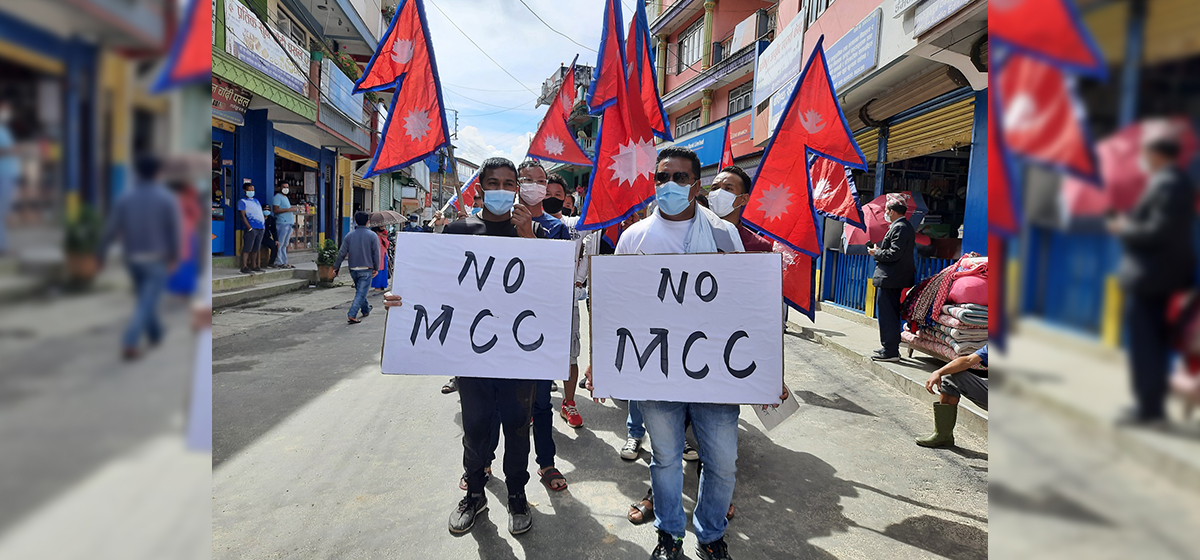
The US –led Millennium Challenge Corporation (MCC) project has become very controversial in Nepal. Major political parties Nepali Congress, CPN (UML), and CPN (Maoist) had agreed to ratify and implement by giving a green signal from the parliamentary vote. With it, Nepali society is divided on the issue of MCC. Still, there have been mass protests against the MCC. Major parties had betrayed the Nepali people. They also attacked Nepal’s core national interests. Many experts opined that MCC is not favorable in the context of Nepal’s sovereignty, national interests, and foreign policy principles.
The Millennium Challenge Corporation (MCC) project in Nepal has generated mixed reactions within the country, and it’s evident that many Nepali are not particularly welcoming of it. One of the primary concerns revolves around the perceived infringement on Nepal’s sovereignty. Some citizens and political factions argue that the MCC agreement has strings attached that could compromise Nepal’s ability to make independent decisions in its best interest. The project’s perceived alignment with the United States and its strategic interests in the region has fueled suspicions of ulterior motives. This skepticism has given rise to public protests and debates in the Nepali political arena.
Furthermore, the MCC project has faced opposition on the grounds of its environmental impact and land acquisition process. Many locals fear that the construction of roads and other infrastructure might lead to environmental degradation, disrupt their traditional ways of life, and potentially displace communities. The lack of transparent information regarding the project’s potential consequences has fueled the discontent among various segments of the population. This has resulted in an atmosphere of distrust and resistance towards the MCC project, making it challenging for the government to secure public support.
The timing of the MCC project’s implementation has also played a significant role in the lukewarm reception it has received. The project’s approval coincided with a period of political instability in Nepal, with frequent changes in government leadership. This political uncertainty has hindered the effective execution of the MCC agreement and has left many Nepali questioning the government’s priorities during a time when internal challenges need immediate attention. All these factors combined have contributed to the prevailing sentiment among many Nepali that the MCC project might not be in their best interest, leading to a general lack of enthusiasm and a sense of wariness towards its implementation.
The protests against the implementation of the Millennium Challenge Corporation (MCC) project in Nepal are, in part, fueled by the controversial role this organization has played in other countries. Many Nepali citizens are wary of the MCC’s track record, which includes instances of controversy and allegations of interference in the internal affairs of recipient nations. For example, in Sri Lanka, the MCC-funded project faced opposition due to concerns over land acquisition and potential negative environmental impacts. Similarly, in Mongolia, the MCC’s involvement in a railway project led to allegations of corruption and undue influence. These international precedents have made many Nepali skeptical about the potential consequences of the MCC project in their own country.
Another example of MCC-related controversy comes from Malawi, where the MCC suspended its partnership over concerns about governance and corruption. This raised questions among Nepali citizens about the adequacy of safeguards in place to ensure that the funds allocated for the MCC project in Nepal would be used transparently and effectively. The controversy in Malawi demonstrated how the MCC is willing to halt projects if certain conditions are not met, adding to the uncertainty surrounding the Nepali implementation. This skepticism about the MCC’s ability to ensure the proper use of funds and the project’s impact on local communities has contributed to the resistance against its implementation in Nepal.
The MCC’s close association with U.S. foreign policy has raised eyebrows in Nepal, given the country’s geopolitical location. Some view the MCC project as an instrument of American influence in the region, which has historically been a sensitive issue. As examples, neighboring countries like China and India have been cautious about foreign involvement in Nepal, viewing it through the lens of regional power dynamics. This apprehension about the MCC’s potential geopolitical implications has further galvanized opposition to its implementation among the Nepali people, who are concerned about maintaining their nation’s sovereignty and autonomy in a complex international landscape.
The Millennium Challenge Corporation (MCC) project in various countries has often raised concerns among neighboring nations, as it can impact their foreign policy dynamics. For instance, the MCC’s involvement in Sri Lanka has been viewed with suspicion by India, given its strategic interests in the Indian Ocean region. The MCC-funded development projects in Sri Lanka, including the construction of roads and highways, have the potential to affect regional connectivity and trade routes, which in turn can influence India’s foreign policy priorities. This situation exemplifies how the MCC’s projects can inadvertently disrupt the foreign policy objectives of neighboring countries by altering regional economic and geopolitical dynamics.
Another notable example can be found in the MCC’s engagement with Mongolia. The MCC’s support for infrastructure development projects, such as a railway, has raised concerns in her neighbor countries. This illustrates how the MCC’s projects can inadvertently hamper the foreign policy goals of other nations, leading to delicate diplomatic situations and potentially affecting regional stability.
There are valid reasons for skepticism and reluctance within Nepal regarding the implementation of the Millennium Challenge Corporation (MCC) project. One major concern revolves around the potential erosion of Nepal’s sovereignty. Many argue that the MCC agreement comes with conditions and clauses that could limit Nepal’s ability to make independent decisions in its best interests. This concern is exacerbated by the perception that the MCC project is closely aligned with the strategic interests of the United States in the region. For example, some argue that the MCC project might inadvertently drag Nepal into regional power struggles, jeopardizing its long-standing policy of neutrality and non-alignment. The case of Sri Lanka serves as a cautionary example, where the MCC’s infrastructure projects were seen as a form of foreign interference, leading to significant political and social unrest.
Transparency and information sharing about the project’s potential consequences have been lacking, leading to significant distrust and resistance among various segments of the population. The failure to address these environmental and social concerns adequately has contributed to the prevailing sentiment among many Nepali citizens that the MCC project might not be in their best interest, and it has caused a general lack of enthusiasm and a sense of wariness towards its implementation.
The Millennium Challenge Corporation (MCC) project has faced criticism in various countries for potentially conflicting with their national interests. In several instances, the MCC’s projects have been viewed with suspicion due to concerns over sovereignty and foreign influence. Countries in strategic regions, such as the Asia-Pacific, have been particularly wary of the MCC’s initiatives, seeing them as a tool for advancing the interests of major powers like the United States. These concerns have led to tensions and diplomatic complexities, as countries strive to protect their national interests and maintain their autonomy in the face of external development aid that may come with strings attached or geopolitical implications.















